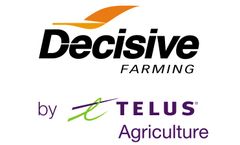Crop Data Management Articles & Analysis
7 news found
What won’t change is our commitment to data transparency and privacy, where farmers own their information and are empowered to choose who they share it with and our commitment to be an independent provider of solutions. TELUS purchased Decisive Farming because they also believe in building a collaborative approach to farm management. They share a ...
Semios, the leading precision farming platform for permanent crops, has raised US$75 million in private equity funding to advance the development of its data-driven crop management solution. ...
AUG crop growth stage estimation technology with AAFC: Prestigious project under AAFC’s AgriInnovation Program for crop management and disease risk assessment Project to provide a commercial tool to facilitate sustainable agriculture management, pest and disease mitigation and resource planning Project will benefit ...
Platform with all field information FarmMaps, the Dutch name is Akkerweb, is the first platform that brings all field information together in one central geo-platform. The ‘cropping plan’ application, based on geo-data within FarmMaps, is the center of all functionalities with added value for operational management, such as ...
On Tuesday, Bayer CropScience inaugurated its new European Oilseed Processing Center in Monheim at a ceremony attended by industry representatives, authorities, agricultural stakeholders and customers. With this facility, the company has substantially expanded its excellent platform to offer oilseed rape growers a fully integrated system from field production to delivery. “We see future ...
The label expansion includes new soil applications, instructions for yield improvement in corn and soybeans, along with additional crops and target pathogens. "This label expansion is an important validation for Regalia, which addresses some of the most challenging aspects of pest management today: resistance to current fungicides and harvest residues," said ...
-Oct. issue of the Agronomy Journal. In an analysis of 18 years of crop yield and farm management data from a long-term University of Minnesota trial, an organic crop rotation was consistently more profitable and carried less risk of low returns than conventional corn and soybean production, even when organic prime premiums were ...







